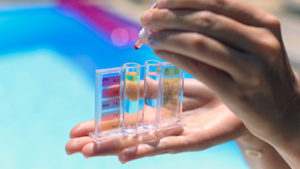Test the water regularly to help maintain a chemical balance in your pool.
While Southerners may enjoy swimming year-round, most Americans are limited to a summer pool season – and that means pool chemical season, too.
Swimming is the fifth most popular leisure activity in the U.S. according to the U.S. Bureau of Labor Statistics and the No. 1 activity for kids and teens, according to Centers for Disease Control and Prevention. With all the commercial and home pools and spas in use, that adds up to a lot of chemicals.
A FEW WORDS ABOUT CHLORINE
Chemicals, specifically chlorine, are needed to sanitize pools because they keep the water clear and all of us safe. Chlorine kills E. coli within 60 seconds and hepatitis A within 45 minutes. Other bacteria and viruses are more stubborn. For example, cryptosporidium can survive as long as 10 days in water. That emphasizes why it’s important to take proper care of your pool and to treat it with chemicals to adequately eliminate bacteria and viruses.
Maintaining the pH balance between acidity and alkalinity is key.
- Excessive chlorine can damage PVC piping and other pool equipment, redden eyes and dry out skin
- Underchlorinated pools enable the growth and survival of bacteria and viruses
- Water that is more acidic or caustic can promote cloudy water, wear and tear to the pool liner and itchy skin
- Water with pH too low prevents chlorine effectiveness
- Water that is too acidic can corrode and etch metal equipment and pool surfaces
CHEMICAL OPTIONS AND SHORTAGES
Although chlorine is the most recognizable pool water chemical, muriatic acid can be used to lower pH. Sodium thiosulfate can be used to lower chlorine levels. Other pool water chemicals play a role: algaecides, fungicides, stain removers, shockers, etc. All these chemicals need to be handled and stored safely. Many pool products can cause severe burns to eyes, irritation and damage to the lungs and skin when mishandled. Follow the manufacturer’s safety instructions.
Little known fact: During the 2021 pool season, we will be facing the biggest chlorine tablet shortage in history. The pandemic led to increased home pool installations and rising demand for chlorine tablets, while a major fire at one of the three chlorine tablet producers has contributed to the shortage.
Chlorine tablets help maintain the chlorine level in the water. Stabilizing tablets containing cyanuric acid (CYA) are especially important in the hot summer sun to help prevent the sun from breaking down the chlorine level. And tablets last longer in suspension compared with powdered chlorine.
UNINTENDED CONSEQUENCES
We are always interested in safety and unintended consequences. The risk with a chlorine tablet shortage is that people may run out of tablets and be forced to use powdered chlorine, cut down on the number of floating tablets required for the size of their pool or use all liquid chlorine.
All chemical reactions expose the water to imbalances and potential pool damage and human illness. What can we do?
- Keep dogs out of pools. A single dog is the equivalent of 50 swimmers, depleting available chlorine levels.
- Shower before entering pools. Oils on skin results in chlorine depletion.
- Switch to a saltwater pool. Saltwater pools produce their own chlorine via electrolysis, but saltwater is corrosive to metal.
- Install ozone or ionization treating equipment. This may be expensive.
- Use powdered chlorine. This form of the chemical does not sanitize as effectively as tablets because it may have to be added more frequently. It also must be diluted in water before being added to the pool.
- Install a mineral system. Although they reduce by 50% the amount of chlorine needed, mineral systems are less harsh on pool equipment and surfaces. Mineral systems are the easiest sanitation system to maintain.
- Use liquid chlorine if you must. This is a less attractive option because the significant volume required takes up more storage space or results in frequent trips to the pool store. Because it is pre-mixed, it also is highly corrosive.
Regardless of sanitation system and the chlorine tablet shortage, keep in mind that under-treated pool water exposes you and others to illness. If you cannot obtain chlorine tablets, speak to your pool professional about alternatives. Do not risk your health by swimming in contaminated water. Remember, just because the water looks clear does not mean it’s safe!
MORE INFORMATION
Centers for Disease Control and Prevention:
Prior posts:
This loss control information is advisory only. The authors assume no responsibility for management or control of loss control activities. Not all exposures are identified in this article. Contact your local, independent insurance agent for coverage advice and policy service.
The post Healthy swimming: A matter of chemistry appeared first on The Cincinnati Insurance Companies blog.
from The Cincinnati Insurance Companies blog https://ift.tt/3fZ9pGm

Post a Comment
Post a Comment